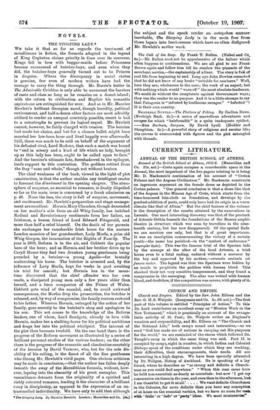NOVELS.
THE STOOPING LADY.* WE take it that so far as regards the treatment of misalliances in fiction, the formula adopted in the legend of King Cophetua claims priority in time over its converse. Kings fell in love with beggar-maids before Princesses became enamoured of butcher-boys, and even when they did, the butcher-boys generally turned out to be Princes in disguise. Where the discrepancy in social status is genuine, few even of modern writers have had the courage to carry the thing through. Mr. Barrie's butler in The Admirable Crichton is only able to surmount the barriers of caste and class so long as he remains on a desert island ; with the return to civilisation and Mayfair his romantic aspirations are extinguished for ever. And so in Mr. Maurice Hewlett's brilliant Georgian novel, though heredity, political environment, and half-a-dozen other factors are most adroitly utilised to render an unequal courtship possible, resort is had to a catastrophe to prevent its logical sequel. Mr. Hewlett cannot, however, be fairly charged with evasion. The heroine had made her choice, and but for a chance bullet might have married her low-born lover and lived happily ever afterwards. Still, there was much to be said on behalf of the argument of his defeated rival, 'Lord Rodono, that such a match was bound to "end in misery and a kind of life which no lady, brought up as this lady has been, ought to be called upon to face." And the heroine's ultimate fate, foreshadowed in the epilogue, lends support to this contention. The goddess retired from the fray "sane and whole," though not without bruises.
The chief weakness of the book, viewed in the light of plot construction, is that the author enables any intelligent reader to forecast the denoitment in the opening chapter. The atmo- sphere of suspense, so essential to romance, is finally dispelled so far as the main issue is concerned by a frank admission on p. 48. None the less, the story is full of surprise, movement, and excitement. Mr. Hewlett's preparation and stage manage- ment are excellent. Hermia Mary Chambre, though descended on her mother's side from an old Whig family, has imbibed Radical and Revolutionary sentiments from her father, an Irishman, a bosom friend of Lord Edward Fitzgerald, and more than half a rebel himself. On the death of her parents she exchanges her ramshackle Irish home for the austere London mansion of her grandmother, Lady Morfa, a grim old Whig Gorgon, the incarnation of the Rights of Family. The year is 1809, Reform is in the air, and Cobbett the popular hero of the hour; and as Hermia and her brother drive up to Caryll House they find two drunken young gentlemen being pounded by a butcher—a young Apollo—for brutally maltreating his horse. The butcher is arrested and, by the influence of Lady Mode, kept for weeks in gaol awaiting his trial for assault; but Hermia has in the mean- time discovered that the chief offender was her own uncle, a dissipated young man only a few years older than herself, and a boon companion of the Prince of Wales. Cobbett gets wind of the scandal, and, to avoid awkward consequences, the Morfas drop the prosecution, the butcher is released, and, by way of compromise, the family custom restored to his father. Whereon Hermia, outraged by the action of her family, goes secretly to the butcher's shop and apologises to his son. This act comes to the knowledge of the Reform leaders, one of whom, Lord Sandgate, already in love with Hermia, makes her a stalking-horse for his political ambitions and drags her into the political whirlpool. The interest of the plot thus becomes twofold. On the one hand there is the progress of the Reform movement as illustrated by a series of brilliant personal studies of the various leaders ; on the other there is the progress of the romantic and clandestine courtship of the heroine by David Vernonr, who, but for the sole dis- ability of his calling, is the finest of all the fine gentlemen who throng Mr. Hewlett's vivid pages. One obvious criticism may be made in conclusion,—that the author has fallen deeply beneath the sway of the .Meredithian formula, without, how- ever, lapsing into the obscurity of his great exemplar. This resemblance detracts from the originality of a spirited and richly coloured romance, lending it the character of a brilliant essay in discipleship, as opposed to the expression of an un- trammelled individuality. We have only to add that although • The kitooping Laity, By Maurice Hewlett. London Macmillan and Co. [Sal
the subject and the epoch render an outspoken manner inevitable,. The Stooping Lady is in the main free from those lapses into lusciousness which-have so often. disfigured. Mr. Hewlett's earlier work.










































 Previous page
Previous page